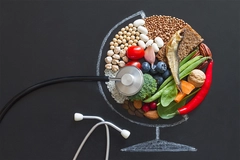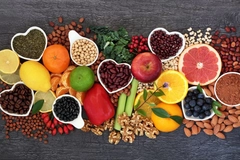
- Industry news
Industry news
- Category news
- Reports
- Key trends
- Multimedia
Multimedia
- Journal
- Events
- Suppliers
Suppliers
- Home
- Industry news
Industry news
- Category news
- Reports
- Key trends
- Multimedia
Multimedia
- Events
- Suppliers
Suppliers
Flavanols may protect men’s vascular health during prolonged sitting
Key takeaways
- Men who consumed a high-flavanol cocoa drink before sitting for two hours did not experience declines in artery elasticity.
- The protective effects of flavanols were observed in both fitter and less fit men, suggesting they can support vascular health in individuals with varying fitness levels.
- Nutrition experts note that the study’s small sample size, short duration, and focus on healthy men limit its implications.

New research suggests that eating flavanol-rich foods like tea, berries, or cocoa may protect men’s vascular health from the adverse effects of prolonged sitting. Participants who drank a high-flavanol cocoa drink before sitting for two hours did not experience flow-mediated dilatation, which measures the elasticity of the arteries.
However, men drinking a low-flavanol drink did experience this decline. The authors point to earlier research that a 1% reduction in vascular function, as measured by flow-mediated dilatation, leads to a 13% increased risk of cardiovascular diseases like heart disease, strokes, and heart attacks.
“Our research shows that consuming high-flavanol foods and drinks during periods spent sitting down is a good way to reduce some of the impact of inactivity on the vascular system,” says leading author Dr. Catarina Rendeiro, assistant professor in Nutritional Sciences at the University of Birmingham, UK.

“Given how common sedentary lifestyles have become and the increased risk this can have to vascular health, using flavanol-rich food and drink, especially in combination with breaking up periods of inactivity by going for a short walk or standing up, could be a good way to enhance long-term health, no matter the individual’s fitness level.”
Power of flavanols
The team tested whether consuming the polyphenol compounds before sitting for two hours could preserve blood vessel function in the arms and legs of 40 young healthy men. Half of the group had higher levels of fitness.
The research in The Journal of Physiology did not include women, as the authors suspect changes in estrogen levels during the menstrual cycle affect the impact of flavanols on vascular health during sitting. They recommend testing this in a future trial.
 The researchers highlight the importance of mitigating the impact of prolonged sitting on the vascular system to help reduce cardiovascular disease risk.The participants consumed either a high-flavanol cocoa drink, with 695 mg of total flavanols, or a drink with only 5.6 mg of total flavanols. The team assessed artery elasticity through flow-mediated dilatation, arterial resting shear rate, blood flow, systolic and diastolic blood pressure, and leg muscle oxygenation.
The researchers highlight the importance of mitigating the impact of prolonged sitting on the vascular system to help reduce cardiovascular disease risk.The participants consumed either a high-flavanol cocoa drink, with 695 mg of total flavanols, or a drink with only 5.6 mg of total flavanols. The team assessed artery elasticity through flow-mediated dilatation, arterial resting shear rate, blood flow, systolic and diastolic blood pressure, and leg muscle oxygenation.
Both men with higher and lower levels of fitness experienced lower artery elasticity when consuming a low-flavanol drink before sitting. Moreover, this drink increased diastolic blood pressure, decreased shear rate and blood flow, and resulted in declines in muscle oxygenation in both groups.
“Our experiment indicates that higher fitness levels do not prevent the temporary impairment of vascular function induced by sitting when only drinking low-flavanol cocoa,” comments co-author Dr. Sam Lucas, professor of Cerebrovascular, Exercise & Environmental Physiology at the University of Birmingham.
“Importantly, after the high-flavanol drink, both fitter and less-fit participants kept their flow-mediated dilatation the same as it was before sitting for two hours.”
Heart health benefits
The authors note that all individuals can benefit from flavanol intake, regardless of their level of physical fitness. Participants’ baseline levels of cardiorespiratory fitness did not change the vascular benefits of flavanol consumption in the study.
Rendeiro stresses the importance of finding ways to mitigate the impact of prolonged sitting on the vascular system, as it could help reduce the risk of developing cardiovascular diseases.
 High-flavanol foods include tea, berries, apples, and cocoa, though experts caution these foods have a variable flavonoid content and bioavailability.“Whether we are sitting at desks, behind the wheel of a car, on a train, or on the sofa reading a book or watching TV, we all spend a lot of time seated. Even though we are not moving our bodies, we are still putting them under stress.”
High-flavanol foods include tea, berries, apples, and cocoa, though experts caution these foods have a variable flavonoid content and bioavailability.“Whether we are sitting at desks, behind the wheel of a car, on a train, or on the sofa reading a book or watching TV, we all spend a lot of time seated. Even though we are not moving our bodies, we are still putting them under stress.”
Alessio Daniele, a Ph.D. student from the University of Birmingham, adds that it is “quite easy” to add high-flavanol foods into the diet.
“There are cocoa products available in supermarkets and health stores that are processed through methods that preserve flavanol levels. If cocoa isn’t your thing, fruits like apples, plums, berries, nuts, and black and green tea are all common kitchen staples and are readily available.”
Study limitations
While nutrition experts commenting on the study welcome its potential, they also point to several limitations and challenges in consuming a high-flavanol diet.
Tom Sanders, professor emeritus of Nutrition and Dietetics at King’s College London, UK, says “it is already known” that consuming flavanols improves measures of endothelial function — the health and activity of the layer lining blood vessels. However, he says these effects only last a few hours after consumption when blood flavanol levels are high.
“The limitations of this study include that it was conducted in healthy individuals without impaired endothelial function,” he adds. “While this study demonstrated increased blood flow, this does not necessarily mean it would translate into longer-term protection of blood vessels. Impaired endothelial function is commonly associated with diabetes, hypercholesterolaemia, and smoking/vaping, and this study provides no evidence that it would reverse the changes in these groups.”
Dr. Ian Johnson, a nutrition researcher and Emeritus Fellow at the UK Quadram Institute, cautions that the results were achieved with a relatively high dose of a well-defined cocoa extract.
“Achieving similar results using more conventional plant foods, such as berries and teas, may be more difficult due to their variable flavonoid content and bioavailability. As the authors themselves acknowledge, further research will be necessary to translate these encouraging results to everyday diets.”

















